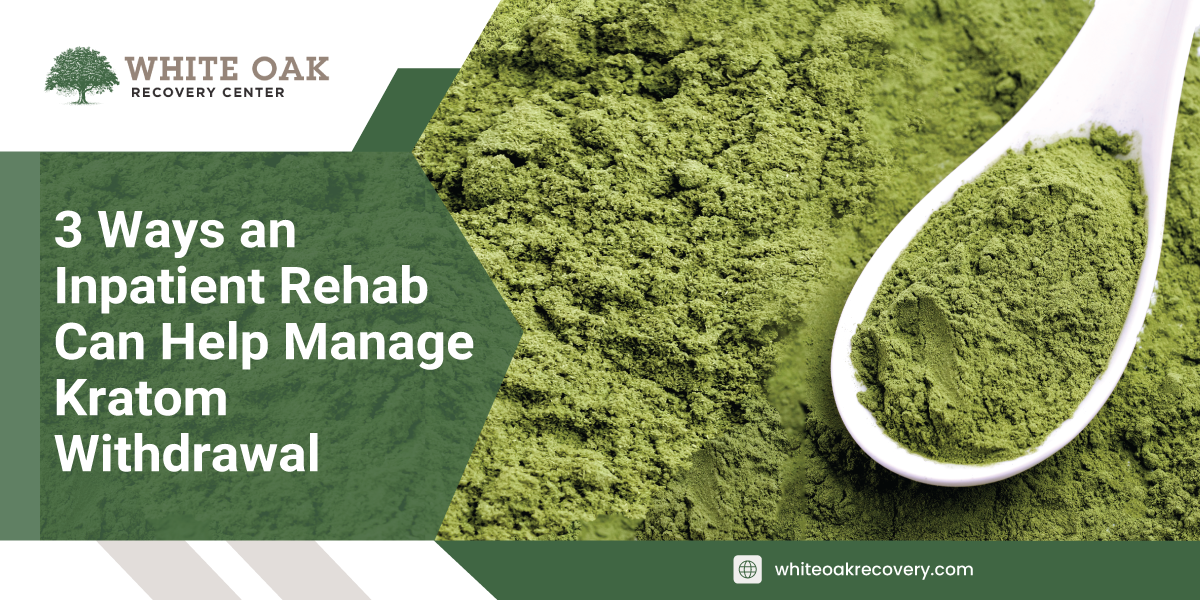3 Ways an Inpatient Rehab Can Help Manage Kratom Withdrawal


Medical Writer:
Nisa Samar
Reviewer:

Johnny Kim
Executive Psychotherapist
Medical Writer:
Nisa Samar
Reviewer:

Johnny Kim
Executive Psychotherapist
Kratom withdrawal can be painful, as it shows symptoms like gut issues, chills, muscle aches, itchiness, mood swings, and increased heartbeat. These are all signs of dependence, which can be treated at the right inpatient rehab in three ways:
- Medical Detox: Using NSAIDs, antidepressants, and anti-anxiety drugs to get rid of the kratom withdrawal symptoms.
- Behavioral Therapies: Working on self-destructive patterns to cope with kratom cravings.
- Successfully Dealing with Physical Changes: MAT helps with stabilization after experiencing withdrawal treatment with medications and behavioral therapies.
To start your withdrawal journey and ease kratom withdrawal symptoms, with the individualized treatment plans, call 1-844-955-2438 us today!
Table of Contents
Toggle
3 Ways an Inpatient Rehab Can Help Manage Kratom Withdrawal
An Inpatient rehab may help in the following ways:
1. Providing Medical Detox
Searching for “Can you withdraw from Kratom at home?” You simply cannot if you are addicted to it, especially if you have a history of polysubstance use. Medical detox is an approach that focuses on removing the detrimental effects of withdrawal with 24/7 medical care. This approach ensures that relapse doesn’t happen and no signs of the drug shows up in the drug and alcohol evaluation tests.
2. Offering Medicated Assisted Treatment (MAT)
The withdrawal symptoms are not limited to psychological changes. It shows risks associated with physical health as well.
For instance,
- Fatigue
- Disrupted sleep cycle
- Changes in weight
- Loss of appetite
- Headaches
- Sweating
- Palpitations
- Respiratory arrest
- Vomiting
- Hallucinations
- Symptoms of liver damage1
Medicines that help with opioid use disorder are used in conjunction with therapy sessions at a luxury private rehab to get off Kratom.
3. Deals with Psychological Aspects
When a person uses Kratom regularly, it triggers the already existing mental disorders. And, continual use of Kratom can lead to:
- Anxiety and depression
- Confusion
- Mood swings
- Memory loss
- Impaired thinking
These psychological changes can severely impact a person’s personal and professional life. In such cases, as per studies, one of the best Kratom withdrawal tips is to choose different types of therapies and counseling.2 These therapies include dual diagnosis, CBT, DBT, recreational therapies, family therapy, and more.
“I remember being dry, off of it for a little while, and I took the amount I normally took, which was like a heroin horror story. I drank two bottles, and I passed out, and I woke up, God knows how long later, and I had cracked my head. But I didn’t know it could kill me.” Maxwell

Treatment Options At White Oak Recovery For Kratom Withdrawal
White Oak Recovery is a private luxury rehab that offers around-the-clock support during the withdrawal phase with these treatment approaches:
1. Inpatient Treatment/Residential Therapy
Our private rehab offers a comfortable, flexible, and safe environment. Our specialists provide 24/7 support and care, along with the various therapies designed to reduce cravings and promote emotional stability.
| Features | Description |
| Individual Counseling | Our individual counseling aims to give you knowledge, guidance, and skills to address personal struggles during withdrawal. |
| Structured Routine | Our inpatient treatment helps you manage a healthy routine. From your sleep cycle to relaxation techniques, our DEA-certified therapists are here to support you. |
| Awareness Sessions | Our experts give you awareness on managing stress, the triggers, and the cravings of withdrawal treatment. |
| Group Sessions | You will have people suffering from Kratom addiction in the facility to support you in the treatment and share your interests and experiences. This helps you learn and apply new techniques for recovery. |
2. Medical Detox
To get over Kratom, it is necessary to remove the harmful substance that comes from frequent usage. These active substances are removed at our private luxury rehab by using medications like:
3. Dual Diagnosis
Many people have an addiction along with mental illness, without knowing. Dual diagnosis programs patients to address the root cause of addiction. After a thorough drug and alcohol evaluation, the goal of our dual diagnosis in withdrawal is to help you stop the urge to use it. Our certified dual diagnosis therapists also educate your family about the comprehensive inpatient dual diagnosis program. The compassion and support received during the program attract more families to choose private dual-diagnosis treatment.
4. Cognitive Behavioral Therapy
It is a behavioral therapy at our private luxury rehab that takes away the negative and unhelpful thoughts that may come in the way of treatment for withdrawal. For instance, CBT helps you understand that you don’t need this drug to control your emotions as you do your daily activities.
5. Dialectical Behavior Therapy
Our DEA-certified DBT therapist in North Hollywood helps you implement the skills you learn during CBT. DBT helps a person avoid feelings of anger and irritability that occur during withdrawal. If you have suicidal tendencies, depression, emotional dysregulation, or BPD, you must consider DBT with addiction treatment.
6. Intensive Outpatient Program
White Oak Recovery Center offers IOP, which is a non-residential therapy to help you with withdrawal and substance use disorder. For individuals who need to balance their professional and personal responsibilities and don’t prefer sleeping at a facility, this is a suitable option.
7. Medication-Assisted Therapy
Our exclusive private rehab helps in treating withdrawal symptoms and assists in post-recovery to reduce the risk of relapse and overdose. With MAT, we encourage the residents to develop a positive mindset post-recovery to overcome their hazardous addiction cycle. Besides that, we put you on medications to strengthen the brain that was previously hijacked by the substance.
Did You Know
According to various studies, the adverse health events connected with Kratom use include hepatotoxicity, seizure and coma, lung injury, kidney injury, and cardiotoxicity.
Length of Recovery After Quitting Kratom At a Rehab
The Kratom withdrawal timeline depends on the short-term or long-term use of the substance. The ultimate answer to what helps with withdrawal is an exclusive private rehab.
Initially, the withdrawal symptoms start with craving, anxiety, flu-like symptoms, and irritability. Within a week, the individual may feel that the physical effects are going away. However, mental challenges, such as mood swings, depression, and anxiety, may persist for a prolonged period.
To ease the withdrawal symptoms and reduce the length of the Kratom withdrawal, a luxury private rehab gives you continuous support and a holistic treatment plan.
Want to check if you’re covered for kratom addiction treatment at White Oak Recovery? Verify your insurance benefits today!
FAQs
Here are your frequently asked questions about Kratom withdrawal:
How to taper off Kratom?
Quitting Kratom is similar to opioid addiction as it involves physiological dependence. Therefore, the best way to manage withdrawal is to find a reliable addiction rehab.
How to stop Kratom cold turkey?
Going kratom cold turkey refers to stopping the consumption suddenly and completely. At-home detox can be strenuous and may result in relapse. Hence, to stop cold turkey, opting for medical supervision is a practical method.
How long does Kratom withdrawal insomnia last?
Depending on the chemical dependence of an individual, insomnia may last for a couple of days to several weeks.
Can I use suboxone for Kratom withdrawal?
While not FDA-approved specifically for Kratom, Suboxone is often used off-label under medical supervision to manage opioid-like withdrawal symptoms. However, it is always advised to seek help from professionals.
How long is Kratom withdrawal?
Normally, withdrawal may last for three days. Depending on the magnitude of dependence on Kratom, it may last a few months as well.
What does Kratom withdrawal feel like?
Gastrointestinal distress, anxiety, restlessness, tiredness, craving, grumpiness, and much more.
References
- https://journals.lww.com/hep/citation/2015/03000/cholestatic_hepatitis_from_prolonged_kratom_use__a.40.aspx
- https://wmpllc.org/ojs/index.php/jom/article/view/2832
- https://www.nhs.uk/medicines/dihydrocodeine/about-dihydrocodeine/
- https://americanaddictioncenters.org/suboxone
- https://medlineplus.gov/druginfo/meds/a618036.html


Am I covered for addiction treatment?
Your insurance may cover treatment. Call now for an entirely free and confidential assessment. Recovery starts with a phone call.

Medical Disclaimer:







